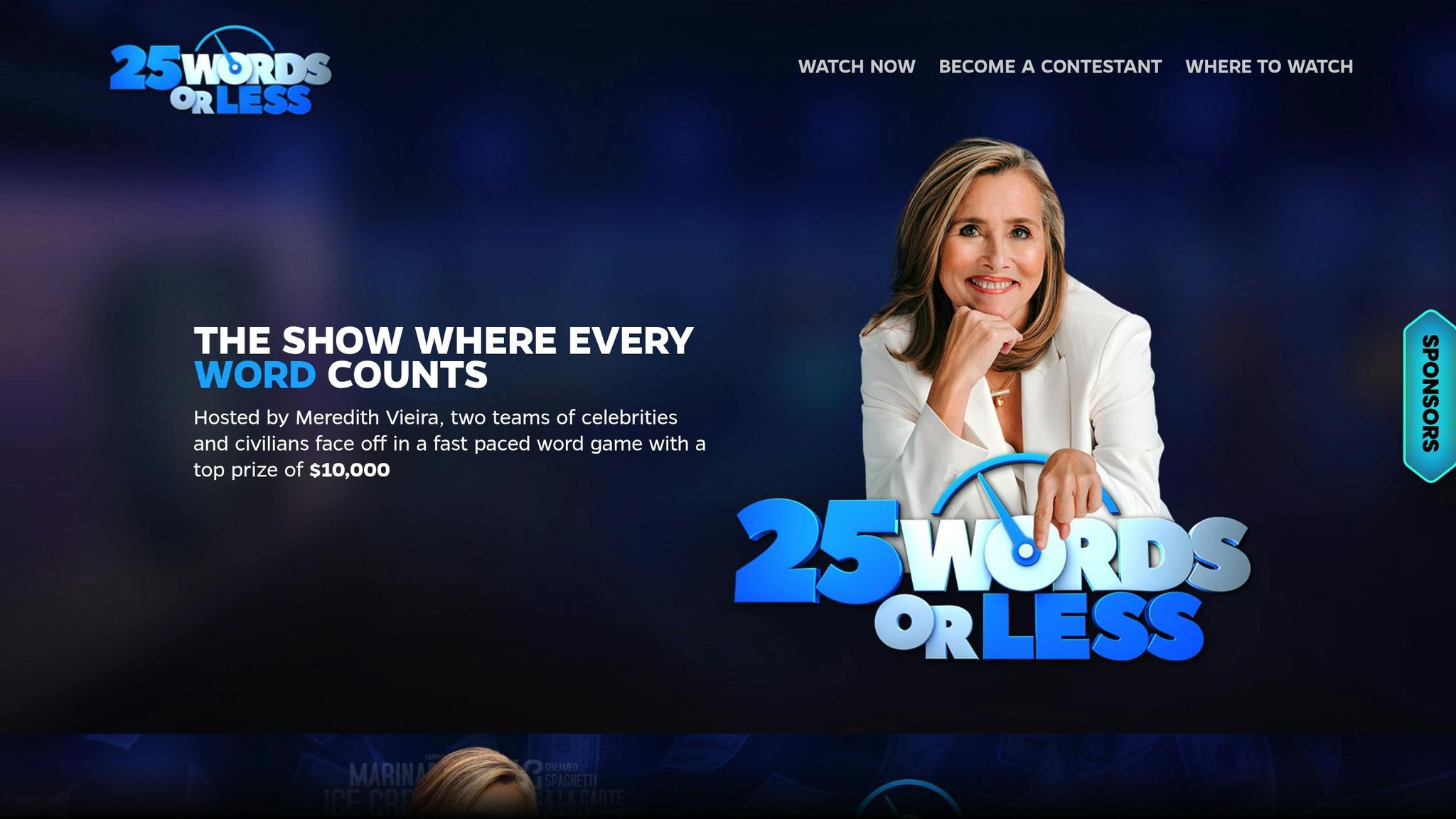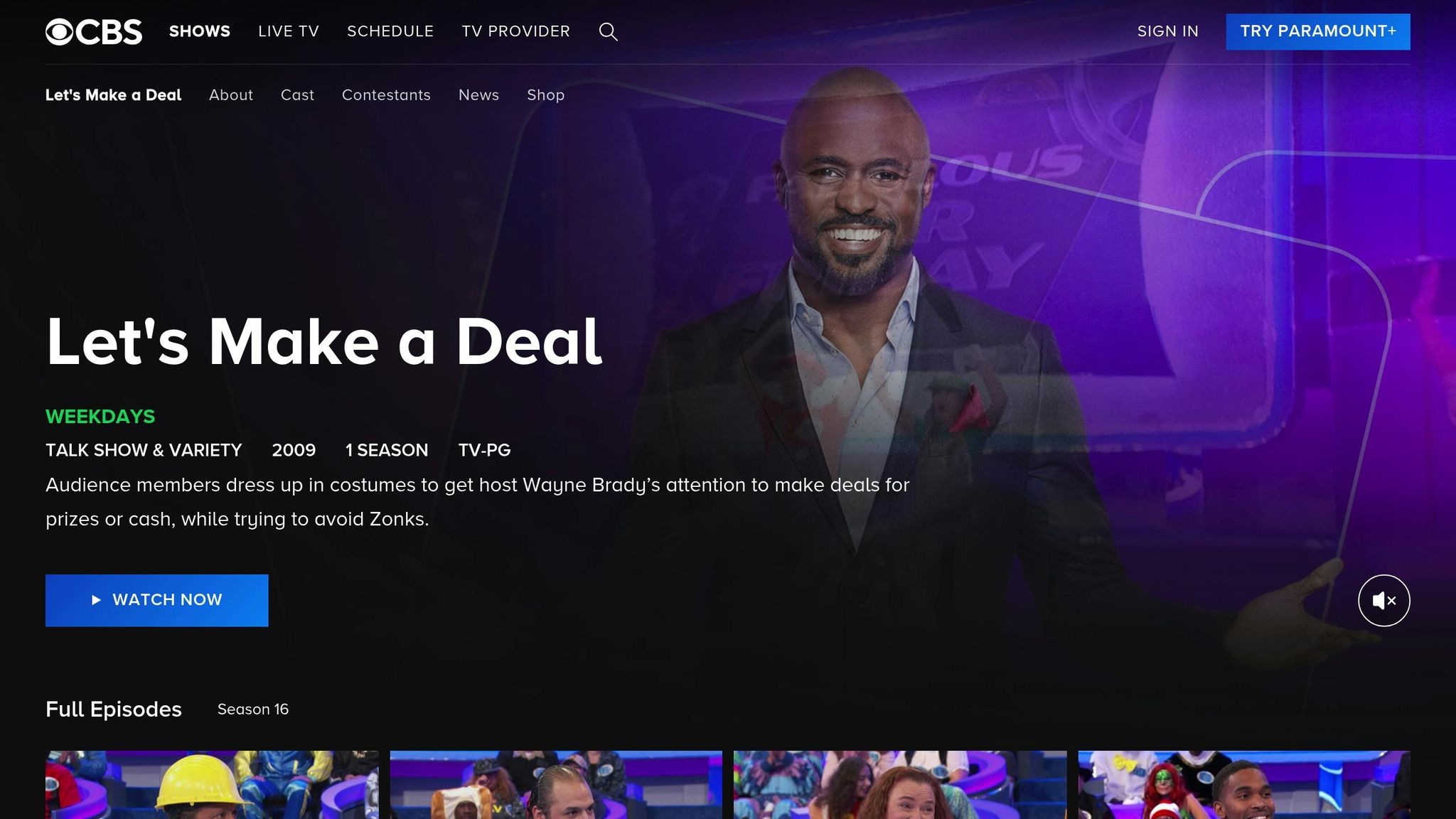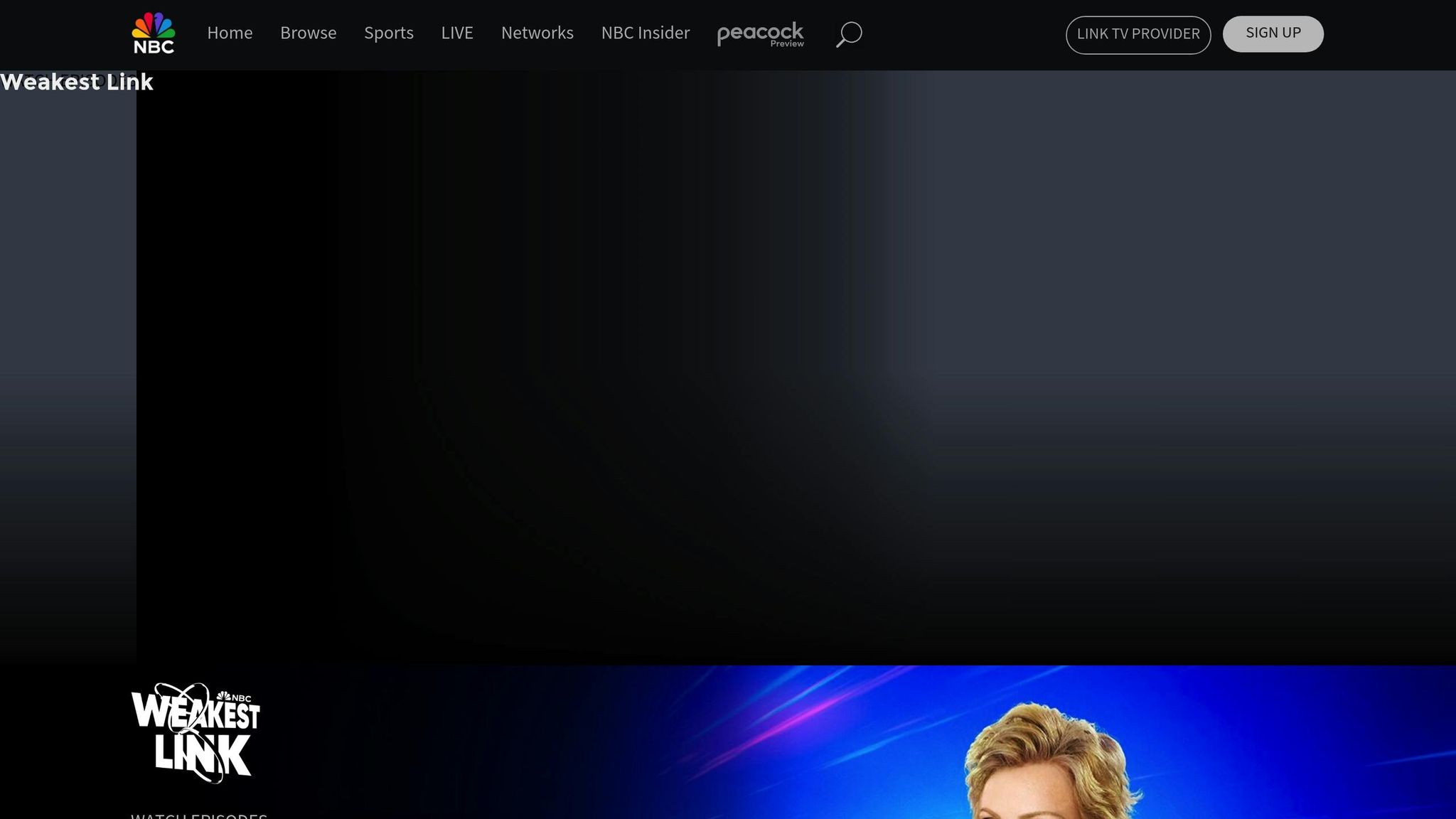Looking for the best trivia shows to test your knowledge or simply enjoy some brain-teasing entertainment? Here's a quick guide to 10 must-watch TV trivia game shows:
- Jeopardy!: Iconic for its answer-and-question format, now in its 41st season, with legendary contestants like Ken Jennings and Amy Schneider.
- Who Wants to Be a Millionaire: Climb a 15-question ladder to win $1,000,000 using lifelines like 50/50 and Ask the Audience.
- Family Feud: Survey-based gameplay where families guess the most popular answers from 100 surveyed participants.
- America Says: Teams guess fill-in-the-blank answers with letter clues in a fast-paced format.
- 25 Words or Less: Teams use fewer than 25 one-word clues to guess words, blending strategy and quick thinking.
- Let's Make a Deal: Contestants in costumes trade for cash or prizes, hosted by Wayne Brady.
- Split Second: Players buzz in to answer category-based clues in a race against time.
- Cash Cab: Trivia meets taxi rides, where passengers answer questions for cash prizes - or risk being kicked out.
- The Chase: Contestants face off against top quiz champions in a mix of strategy and speed.
- Weakest Link: Teams answer questions to build a cash pot, but vote to eliminate the "weakest link" after each round.
Quick Comparison
| Show Title | Unique Feature | Air Dates |
|---|---|---|
| Jeopardy! | Answer-in-question format | 1964–present |
| Who Wants to Be a Millionaire | Lifelines and $1M prize format | 1999–present (various runs) |
| Family Feud | Survey-based answers | 1976–present |
| America Says | Fill-in-the-blank with letter clues | 2018–2022 |
| 25 Words or Less | Word-guessing with limited clues | 2019–present |
| Let's Make a Deal | Audience participation in costumes | 1963–present (various runs) |
| Split Second | Fast-paced category-based trivia | 1972–1975; 2023–present |
| Cash Cab | Trivia in a taxi | 2005–2012; 2017–2020 |
| The Chase | Quiz battles against expert Chasers | 2013–2015; 2021–2023 |
| Weakest Link | Strategic eliminations and trivia | 2001–2003; 2020–present |
These shows combine unique formats, engaging hosts, and high-stakes prizes to deliver unforgettable trivia experiences. Whether you're a casual viewer or a trivia fanatic, there's something here for everyone.
15 Greatest TV Game Shows To Ever Air | Entertainment Weekly
1. Jeopardy!
Jeopardy! is America’s longest-running quiz show, now in its 41st season, drawing an impressive 20 million viewers each week. The show flips the traditional Q&A format on its head: contestants are given clues as answers and must respond in the form of a question (e.g., "He is the only U.S. president to marry in the White House." → "Who is Grover Cleveland?").
With 45 Emmy Awards and a Guinness World Record for being the most Emmy-awarded game show, Jeopardy! has cemented its place in television history.
"a program you need never apologize for watching"
That’s how Alex Trebek, the show’s beloved late host, described it.
The show’s competitive spirit shines through its legendary contestants. Ken Jennings achieved a 74-game winning streak and earned $2.52 million. Brad Rutter holds the title for the highest earnings at $4.94 million. James Holzhauer’s 32-game streak brought in $2.46 million, and Amy Schneider’s 40-game run earned her $1.63 million. Next up: the thrilling lifelines of Who Wants to Be a Millionaire.
2. Who Wants to Be a Millionaire
Who Wants to Be a Millionaire features fifteen multiple-choice questions, each with four possible answers. Contestants climb a prize ladder, starting small and working toward the $1,000,000 grand prize. The game includes guaranteed prize milestones at question 5 ($1,000), question 10 ($32,000), and the final question ($1,000,000), ensuring players don't leave empty-handed after reaching those points.
Players also get three lifelines to help them during the game, each usable once:
- 50/50: Eliminates two incorrect answers, leaving a 50/50 chance.
- Ask the Audience: The studio audience votes, and their choices are shown as a percentage.
- Phone a Friend: Allows a 30-second call to someone for advice before locking in a "final answer."
For trivia hosts, this format is a masterclass in building tension. Lifelines and prize milestones keep the audience engaged and players on edge. Coming up: Family Feud takes a team-based approach that thrives on fast thinking and group dynamics.
3. Family Feud

Family Feud is all about survey-based gameplay. Two families compete by guessing the most popular answers given by 100 surveyed participants. Points are awarded based on how many people gave that answer, and the first team to reach 300 points wins the game. Since its debut in 1976, this show has become a cornerstone of American television.
Trivia hosts can take inspiration from this format by creating engaging survey questions with multiple possible answers to encourage friendly competition.
Next: America Says.
4. America Says
Hosted by John Michael Higgins, America Says takes inspiration from Family Feud's survey-style gameplay. In this fast-paced show, two teams of four compete to guess the top seven answers to fill-in-the-blank surveys within 30 seconds. The catch? They only get the first letter of each answer as a clue. If a team leaves any answers on the board, their opponents can swoop in and steal them. After three rounds with increasing point values, the team with the highest score wins $1,000 and advances to a bonus round. In the 60-second bonus round, they must complete four surveys, with one skip allowed, for a chance to win $15,000.
John Michael Higgins' quick wit and humor have earned him recognition. The Herald-Dispatch described him as:
"Higgins is just as adept at hosting as he is at providing classic sitcom moments".
America Says has been a hit for the Game Show Network, boosting time-slot ratings by 26% and increasing viewership among women aged 25–54 by over 40%. The show's popularity has even led to a live version, Crowd Says, which is now featured at corporate events and parties.
Next: 25 Words or Less.
5. 25 Words or Less

25 Words or Less, hosted by Meredith Vieira, is a word-guessing game show that mixes strategy and excitement. Two teams, made up of celebrities and everyday contestants, face off in a fast-paced competition that keeps viewers hooked.
The gameplay is simple yet challenging: one team member provides clues - using fewer than 25 one-word hints - to help their teammates guess five words. After two rounds, the leading team moves on to a bonus round. Here, they must guess 10 words within 60 seconds, using no more than 25 clues, to win a $10,000 prize. This format rewards quick thinking and sharp communication skills, offering a fresh twist on word-based challenges seen in shows like America Says.
With its focus on speed and language precision, the show delivers a fun and engaging experience, showcasing the power of smart strategy and teamwork.
Next: Let's Make a Deal brings audience members center stage with surprise prizes.
sbb-itb-46dff1a
6. Let's Make a Deal

Let's Make a Deal, hosted by Wayne Brady, brings together about 200 costumed audience members who take their chances to win cash or exciting prizes - while steering clear of the dreaded "Zonks." The show features live deals and quick "Quickie Deals", where viewers can score rewards by having specific items on hand. Wayne Brady’s quick humor and occasional musical performances add a unique twist, blending comedy with the thrill of unpredictable outcomes.
"My favorite pieces are when people come to the show who are in dire need - who tell us their house burned down or they lost their 401K - and we're able to give them something in the place of what they don't have. That's the best part about this."
– Wayne Brady
The show thrives on its high-energy environment, choosing participants who come dressed in creative costumes to match its lively and playful atmosphere. This mix of suspense, humor, and audience participation makes the format both engaging and memorable.
Split Second takes the suspense a step further, challenging contestants to buzz in with correct answers under intense time pressure, keeping the excitement alive.
7. Split Second
Split Second made a comeback on GSN in 2023, hosted by Jon-Michael Higgins. The game pits three contestants - one of whom is a returning champion - against each other. Players buzz in after seeing three clues tied to a specific category. The first to buzz gets to choose one clue to answer. If they get it wrong, the other players can try to answer the remaining clues.
The original version aired on ABC from 1972 to 1975 with Tom Kennedy as the host. Back then, the game used a cash-based scoring system: $25 for a solo correct answer (which doubled mid-game), $10 when two players answered, and $5 when all three got it right. Contestants were then seeded by score for a handicapped final round. In the 2023 version, points replace cash for scoring, and the bonus round is a multiple-choice challenge where contestants can win $10,000.
Next: Cash Cab takes trivia to the streets of New York City.
8. Cash Cab
Cash Cab mixes a regular taxi ride with a trivia game. Hosted by Ben Bailey in New York City, unsuspecting passengers hop in, only to find themselves competing for cash prizes, ranging from $10 to $1,000, by answering general knowledge questions. But there’s a catch - if they get too many answers wrong, they’re kicked out of the cab mid-ride. This format adds tension and excitement to every question.
Trivia hosts looking for inspiration could use a similar surprise element to create pop-up quizzes in unexpected places.
From street taxis to high-pressure studio settings, The Chase offers a different spin with its intense quiz battles.
9. The Chase
Each episode kicks off with a 60-second Cash Builder round, where contestants answer as many rapid-fire questions as they can. For every correct answer, they earn $10,000. In the Chase round, players face a choice: stick with their Cash Builder total and start three spaces away from the Chaser, risk more money to start closer (just one space away), or accept a smaller amount to start farther back (four spaces away). From there, they must make their way across a seven-space board without getting caught by the Chaser.
The Chasers are some of the most accomplished quiz champions, including:
- Ken Jennings: Holds the record for most Jeopardy! wins
- James Holzhauer: Known for his high-stakes Jeopardy! strategy
- Brad Rutter: Jeopardy!'s all-time top earner
- Victoria Groce: Finalist in the World Quiz Championship
In the Final Chase, any remaining contestants get two minutes to build a lead, gaining one space for each team member. Then, the Chaser has two minutes to try to catch them.
Next: Weakest Link adds a twist with eliminations under time pressure.
10. Weakest Link

Broadcast on NBC and hosted by Jane Lynch, The Weakest Link combines trivia knowledge with strategic gameplay. Teams work together to answer questions correctly, building a shared cash pot. Each correct answer increases the total, but a single wrong answer wipes out any unbanked money.
After every round, contestants vote to eliminate the "weakest link" - the player they feel contributed the least. This twist introduces a mix of strategy and social dynamics, as players must weigh trivia performance against alliances to avoid being the next to go. Lynch's sharp commentary adds an extra layer of entertainment to the high-stakes decision-making.
Next: See how these shows compare in our detailed features breakdown.
Show Features at a Glance
Here’s a quick side-by-side comparison of each show's broadcast history:
| Show Title | Air Dates |
|---|---|
| Jeopardy! | 1964–present |
| Who Wants to Be a Millionaire | 1999–2002; 2002–2019; 2020–present |
| Family Feud | 1976–1985; 1988–1995; 1999–present |
| America Says | 2018–2022 |
| 25 Words or Less | 2019–present |
| Let's Make a Deal | 1963–1977; 1980–1981; 1984–1986; 1990–1991; 2003; 2009–present |
| Split Second | 1972–1975; 1986–1987; 2023–present |
| Cash Cab | 2005–2012; 2017–2020 |
| The Chase | 2013–2015; 2021–2023 |
| Weakest Link | 2001–2003; 2020–present |
What sets these shows apart goes beyond their air dates. Let’s break it down:
Key Elements
- Question Styles: Each show has its own approach to trivia. For example, Split Second uses fast-paced questioning, while Jeopardy! takes a more deliberate and thought-provoking route.
- Team Dynamics: Shows like Family Feud and Weakest Link bring an added layer of strategy by incorporating group dynamics alongside trivia.
- Prize Structures: High-stakes rewards are a big draw for modern audiences, with many shows offering large cash prizes to keep things exciting.
- Host Interaction: A good host can make or break a show. From humor to tension-building, hosts play a huge role in keeping viewers engaged.
Many of these shows have also embraced technology and social media to stay relevant, blending classic trivia formats with modern twists. Whether you enjoy competing solo or prefer team-based challenges, there’s likely a format that fits your style.
Key Takeaways
These classic TV game shows highlight four strategies you can use to elevate any trivia event:
Creative Question Formats
Vary your question styles to challenge different types of knowledge and keep things interesting. Combine formats like multiple-choice and survey-style questions to hold participants' attention.
Keeping Participants Engaged
Maintain interest by gradually increasing difficulty and adding timed challenges. Features like a high-stakes final round or rapid-fire segments can keep the energy high.
Flexible Event Structure
Incorporate key elements like increasing difficulty, teamwork, time limits, and visual aids. These components can help you design trivia rounds that are both fun and challenging.
Connecting with Your Audience
Create a welcoming environment where everyone feels encouraged to join in, whether they’re competing or just watching.
